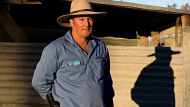It's a crystal clear Wednesday morning and Detective Senior Constable Daryl Olver is roaring down a red dirt road with AC/DC's Back in Black blasting from the speakers in his unmarked police 4WD. Only minutes earlier, the 47-year-old took a call from a sergeant based in the tiny far west NSW town of Menindee. A local farmer, alerted by his barking dogs in the middle of the night, had spotted three poachers rounding up his herd of goats. The farmer had bravely – and at considerable risk – followed their ute for about 80 kilometres to Menindee.
Goats have become popular livestock in country NSW because of recurrent drought, bringing back many landholders from the brink of financial ruin (the price of goat meat has almost doubled in just over two years, from $3.70 a kilogram to nearly $6). But poachers have become a growing problem for embattled farmers, many of whom spend sleepless nights criss-crossing their properties after spotting the glow of headlamps in the bush (former NSW Police assistant commissioner Stephen Bradshaw recently finalised a review into stock theft and trespass with a view to revising penalties).
More Good Weekend Videos
Rural Detective
Detective Senior Constable Daryl Olver beat is around thirty percent of NSW. Fairfax's Edwina Pickles spent some time on the road with him.
Olver is one of 34 rural crime investigators ("RCI") with the NSW police. Along with an offsider, he is responsible for 230,000 square kilometres of western NSW, one-third of the state, stretching from the Victorian border to the Queensland border, and east as far as Ivanhoe. Like the other RCIs, Olver has a lonely job, often finding himself sleeping in a swag on the banks of the Darling River or, if he finds himself in the middle of nowhere after a long day, an empty shearers' quarters on a hospitable farmer's property.
It's hard for city folk to fathom how poachers can steal hundreds of livestock and drive away undetected. But out here you can travel for hours without passing any sign of life. The land can swallow you whole. Such are the vast distances, the perpetrators have usually absconded by the time the RCIs arrive. Proof of guilt can be challenging. "A lot of times the information won't come to you, so you have to go and get it," observes Olver.

Olver and his offsider, Senior Constable Aaron Collis, 41, stride into the police station in Menindee – a tiny town consisting of little more than a combined post office and bank and one grocery store – to get a rundown of the goat theft from the town's sergeant, Paul Roberts. Only the day before, the same farmer who tracked the poachers had shown Olver a set of unusual tyre tracks cutting a path off the road, past a dilapidated timber shed on his property, and down towards the Darling River. It will take Olver another day to track down the poachers, and the 29 goats, to a rundown property outside town.
At worst, stock thieves face a maximum penalty of 14 years in jail. At the very least, and if proving ownership of the goats is impossible, they face a $550 fine for trespassing. If that is all these poachers get, that will be a small price to pay for a trip that could have earned them $2000 from selling the goats.

Having spent his childhood in rural Victoria, Olver was a plumber and shearer before joining the NSW Police Force. As an RCI, he spends long periods away from his wife and kids in Dareton, near the Victorian border. Collis, too, has lived in Dareton for more than five years, after beginning his career in Sydney's Kings Cross. "A lot of the people you were dealing with [in the Cross] were part of a transient population," he says. "Whereas out here, you're dealing with the same people … one day they could be an offender, the next a victim."
As the sun lowers towards the horizon and sends a warm glow across the sky, Olver and Collis spot four pig heads with missing jaws dumped on the roadside. Landholders have recently seen carloads of young men with boots full of alcohol and ammo, and they say some are drugged up to the eyeballs as they let bullets fly. "It is still oozing blood, so can't be that old," Olver notes of one of the heads. But enough time has passed to put those responsible out of reach – at least for now.

The night is spent at a station just outside of Tilpa where the shearers' quarters are basic; the rooms are dusty but the showers run and the kettle boils. Half of Tilpa's town-centre population of six is at the pub by 6pm and talk drifts towards the recent dry. One stockman points to photographs on the pub wall of his property, which resembles an island surrounded by flood waters. He smiles as he talks of the times when the land is awash with green. After taking a final sip of beer, the grizzled old stockman heads home.












